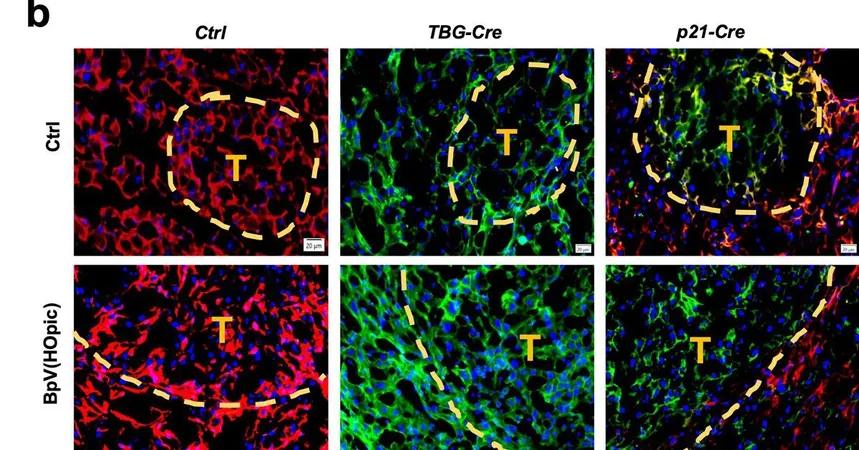
The "Ticking Time Bomb" of Liver Cancer: Understanding the Link Between Diet, DNA Damage, and Disease Progression
2025-01-02
Author: John Tan
Groundbreaking Discovery by UC San Diego Researchers
Researchers from the University of California San Diego School of Medicine have made a groundbreaking discovery regarding the alarming rise of liver cancer, the sixth most commonly diagnosed cancer globally and a leading cause of cancer-related deaths. Their research, recently published in *Nature*, unveils a critical connection between cellular metabolism and DNA damage that fuels the transition from fatty liver disease to liver cancer, potentially opening new avenues for prevention and treatment.
The Alarming Increase in Liver Cancer Rates
Liver cancer, particularly hepatocellular carcinoma (HCC), has witnessed a staggering increase of 25-30% over the last two decades, largely driven by the surging rates of fatty liver disease—a condition affecting approximately 25% of adults in the United States. Among these, around 20% develop a more severe form known as metabolic dysfunction-associated steatohepatitis (MASH), significantly elevating the risk of developing liver cancer. However, the mechanisms that link MASH to liver cancer have remained poorly understood.
Cellular Metabolism and DNA Damage
According to Dr. Michael Karin, a prominent professor at UC San Diego, the transition from fatty liver disease to the deadly MASH and subsequently to liver cancer is alarmingly common. "When faced with MASH, patients often either destroy their liver or face the grim reality of cancer—our understanding of the underlying cellular chaos during this journey remains incomplete," he stated.
Diet-Induced DNA Damage
Utilizing mouse models alongside human tissue samples, the research team discovered that diets high in fats and sugars trigger DNA damage in liver cells, leading them into a state of senescence. While senescence can normally prevent cancerous growth by serving as a protective mechanism against damaged cells, the study found that in liver cells, some of these damaged cells can survive. Dr. Karin likened these cells to "ticking time bombs" that can resume proliferation and potentially become cancerous.
Implications for Liver Cancer Treatment
The alarming findings highlight the direct correlation between diet-induced DNA damage and the emergence of cancer, with crucial implications for developing preventive strategies. The researchers suggest that innovative drugs targeting DNA damage reversal might be key in battling liver cancer, especially in individuals suffering from MASH.
Future Treatment Hypotheses
Dr. Karin posited several hypotheses for future treatments, suggesting that high-fat diets might cause imbalances in the essential materials for DNA repair. This could pave the way for pharmacological interventions to correct such imbalances or the development of novel antioxidants to combat cellular stress that leads to DNA damage.
Aging and Cancer
Beyond potential treatments for liver cancer, the study also sheds light on the intricate relationship between aging and cancer. There is a known risk correlation; aging increases the likelihood of developing various cancers. Yet, with cellular senescence acting as a barricade against malignancy, the research uncovers the paradox whereby some senescent cells can still re-enter the cell cycle, a mechanism that might be prevalent across many cancer types.
Public Health Implications
Insightfully, this study illuminates the imperative need for public health advisories regarding poor dietary habits. Dr. Karin warns, "A fast-food diet can be just as harmful as smoking long-term. The consequences extend beyond aesthetic issues to fundamentally disrupting cellular functioning at the DNA level."
Conclusions and Future Directions
With this trailblazing research, scientists are on the cusp of understanding better how our lifestyle choices dramatically influence our health and susceptibility to diseases like liver cancer. As this field of study evolves, the insights garnered will no doubt be pivotal in mitigating the impact of liver cancer in modern society.
 Brasil (PT)
Brasil (PT)
 Canada (EN)
Canada (EN)
 Chile (ES)
Chile (ES)
 Česko (CS)
Česko (CS)
 대한민국 (KO)
대한민국 (KO)
 España (ES)
España (ES)
 France (FR)
France (FR)
 Hong Kong (EN)
Hong Kong (EN)
 Italia (IT)
Italia (IT)
 日本 (JA)
日本 (JA)
 Magyarország (HU)
Magyarország (HU)
 Norge (NO)
Norge (NO)
 Polska (PL)
Polska (PL)
 Schweiz (DE)
Schweiz (DE)
 Singapore (EN)
Singapore (EN)
 Sverige (SV)
Sverige (SV)
 Suomi (FI)
Suomi (FI)
 Türkiye (TR)
Türkiye (TR)
 الإمارات العربية المتحدة (AR)
الإمارات العربية المتحدة (AR)